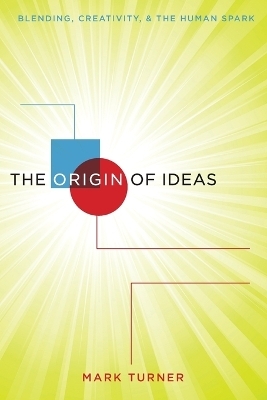
The Origin of Ideas
Oxford University Press Inc (Verlag)
978-0-19-026315-7 (ISBN)
Why are we so innovative? Where do new ideas come from? Why are human beings so exceptionally good at innovation, leaving other species mentally in the dust? How can we hold onto new ideas once they are formed? This book explores the claim that the human spark, the source of innovation and the origin of ideas, was an advance that occurred in a particular kind of mental operation, which Turner calls blending. Blending is our ability to take two ideas or more and create a new idea from the "blend." And what is so fascinating is how human beings are able to engage in blending almost without effort and usually unconsciously. It appears to be second nature to us, how we live and breathe in the course of processing information and ideas.
Human beings are profoundly different from all other species in this ability. While many species can do what we cannot-fly, run amazingly fast, see in the dark--only human beings can innovate. Beginning somewhere in the Paleolithic Age, everything changed in the course of human events. Before that, we were a bunch of large mammals. After that, we were poised to take over the world. Turner makes the controversial and provocative claim that what made human advances possible was the ability to engage in the virtuosity of blending, which is everywhere apparent in our cultural record-in our creations and innovations--it is the origin of our ideas.
Turner's theory of blending is featured in Jonah Lehrer's bestselling book, Imagine, and this book will be the first to lay out this theory in detail for a lay audience and academics tackling the nature of the human brain and the fascinating puzzle of what it means to be human.
Mark Turner, Ph.D., is Institute Professor and Professor of Cognitive Science at Case Western Reserve University. He is the founding director of the Cognitive Science Network and co-director of the Red Hen Lab. His most recent book publications are Ten Lectures on Mind and Language and two edited volumes, The Artful Mind: Cognitive Science and The Riddle of Human Creativity, from Oxford University Press, and Meaning, Form, & Body, edited with Fey Parrill and Vera Tobin, published by the Center for the Study of Language and Information. His other books and articles include Cognitive Dimensions of Social Science: The Way We Think about Politics, Economics, Law, and Society, The Literary Mind: The Origins of Thought and Language, Reading Minds: The Study of English in the Age of Cognitive Science, and Death is the Mother of Beauty.
1. Where Do Ideas Come From? ; 2. Who Are You? ; 3. Who Am I? ; 4. Forbidden Fruit ; 5. The Artful Mind ; 6. The Sweep of Thought ; 7. Eeny, Meeny, Miny, Moe ; 8. Round and Round and Round We Go ; 9. Final Questions ; References ; Index
| Erscheint lt. Verlag | 29.8.2015 |
|---|---|
| Zusatzinfo | With illustrations |
| Verlagsort | New York |
| Sprache | englisch |
| Maße | 231 x 155 mm |
| Gewicht | 431 g |
| Themenwelt | Geisteswissenschaften ► Psychologie ► Allgemeine Psychologie |
| Geisteswissenschaften ► Psychologie ► Entwicklungspsychologie | |
| Geisteswissenschaften ► Psychologie ► Sozialpsychologie | |
| Geisteswissenschaften ► Psychologie ► Verhaltenstherapie | |
| Naturwissenschaften ► Biologie ► Evolution | |
| Naturwissenschaften ► Biologie ► Zoologie | |
| Sozialwissenschaften ► Soziologie | |
| ISBN-10 | 0-19-026315-6 / 0190263156 |
| ISBN-13 | 978-0-19-026315-7 / 9780190263157 |
| Zustand | Neuware |
| Haben Sie eine Frage zum Produkt? |
aus dem Bereich


